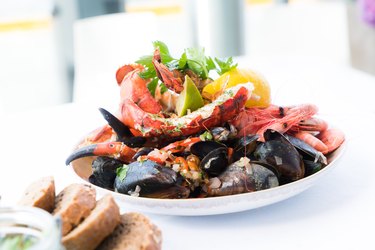
Zinc is largely a beneficial and inoffensive dietary component. Christine Rosenbloom, Ph.D., advises that it's an important contributor to the strengthening of the immune system and even aids the body's ability to heal wounds. It's important to note, though, that having too much or too little zinc in your diet can result in nasty consequences.
What Are the Symptoms?
Video of the Day
Because symptoms of zinc poisoning are similar to those of food poisoning, having a handle on your zinc intake can help you acknowledge or discount the possibility of zinc poisoning if you begin to experience symptoms.
Video of the Day
It's essential you don't mistake one for the other. The National Institutes of Health states that the most common symptoms of zinc poisoning include:
- Nausea and vomiting: a common side effect of zinc toxicity that could be mistaken for food poisoning
- Stomach pain and diarrhea: again, a
common symptom that overlaps with food poisoning
- Flu-like symptoms
- Changes in taste
- Copper deficiency (which can ultimately result in blood disorders)
- Frequent infections
- Lethargy and drowsiness
Read more: Nausea After Zinc
Recommended Zinc Intake
Monitoring your zinc intake can help avoid both toxicity and deficiency. The National Institutes of Health suggests you should ideally be consuming the following amounts of zinc based on your age and gender:
- Men above age 14: 11 milligrams of zinc daily
- Women above age 14: 9 milligrams daily
- Children, ages 4 to 8: 5 milligrams, increasing to 8 milligrams between the ages of 9 to 13
The tolerable upper limit dose, which is the max amount of zinc you should have, is 40 milligrams for adults and 4 milligrams for infants under six months old.
Read more: Maximum Zinc Doses
Foods High in Zinc
Zinc appears in an enormous variety of foods, and this is a good thing. It's a very beneficial mineral for our bodies, which is why so many people incorporate a zinc supplement into their diet. It aids in wound healing, strengthening your immune system and encouraging growth.
However, if you're presently on a zinc supplement and are experiencing any symptoms of zinc poisoning, you should cut down on zinc-rich foods that may contribute to your need for zinc overdose treatment:
- Oysters: These in particular are huge sources of zinc, with a whopping 74 milligrams of zinc per serving.
- Beef: 7.0 milligrams
- Crab: 6.5
milligrams
- Lobster: 3.4
milligrams
- Pork chops: 2.9
milligrams
- Chicken: 2.4
milligrams
Zinc can also be found in some homeopathic medications, nasal gels or sprays and in certain antibiotics. Be sure you know exactly what you're taking and how much zinc you're getting from any medications you take so you can effectively balance your body's needs.
Read more: Iron & Zinc Supplements
Zinc Overdose Treatment
In the event of a zinc overdose, or if you suspect you may have overdosed, first call your local poison control center and inform them. Such overdoses can be highly damaging if left untreated.
In the meantime, if you experience any of the previously mentioned symptoms, drinking milk can alleviate a lot of them and help to return levels to normal. A study published in 2017 in the Journal of Nutrition found that the phosphorus and high protein in milk acts to prevent your body from absorbing any more zinc than necessary.
Zinc is an important mineral for the overall well-being of our bodies and has numerous beneficial effects when used appropriately. Being mindful of the amount you're consuming will allow you to achieve the best possible results for your body.
- Eat Right: Eating for Strength and Recovery
- National Institutes of Health: Office of Dietary Supplements: Zinc
- USDA: Food & Nutrition Research Briefs: Adequate Zinc Vital to Healthy Immune Response
- Mayo Clinic: Zinc
- The Journal of Nutrition: Zinc Absorption from Milk is Affected by Dilution but not by Thermal Processing, and Milk Enhances Absorption of Zinc from High-Phytate Rice in Young Dutch Women